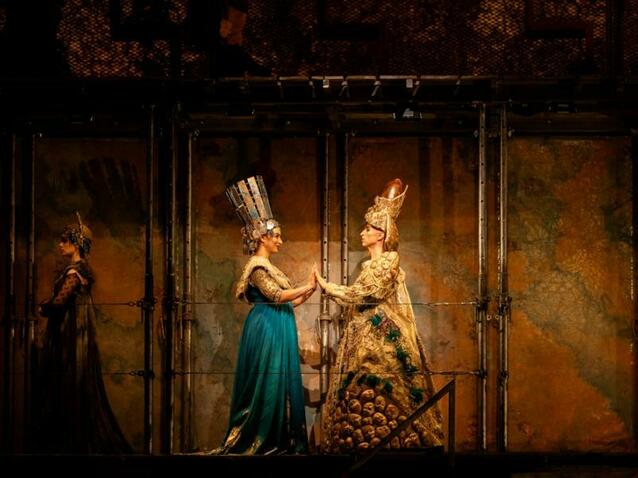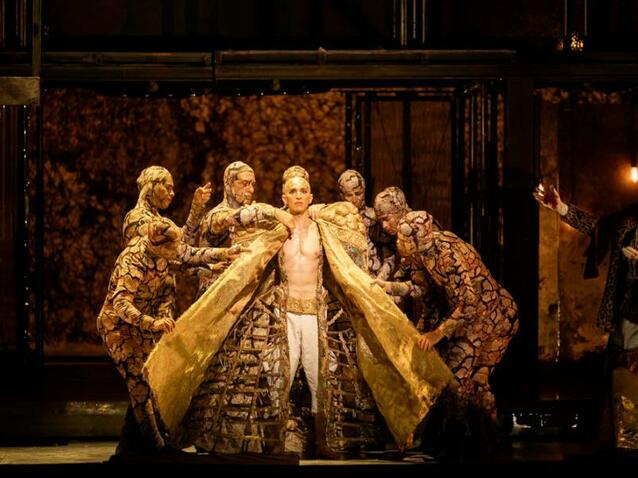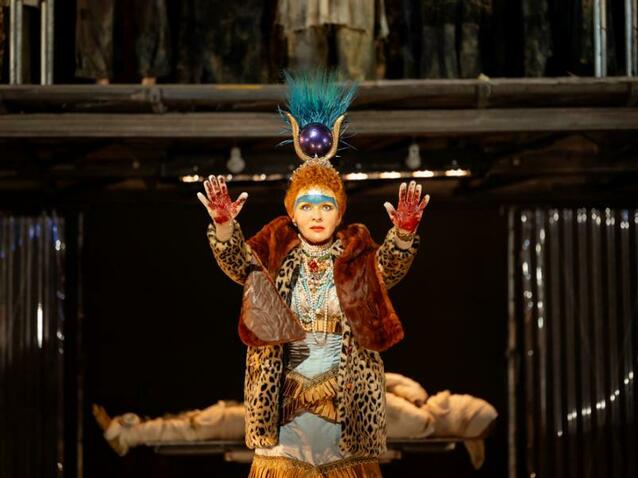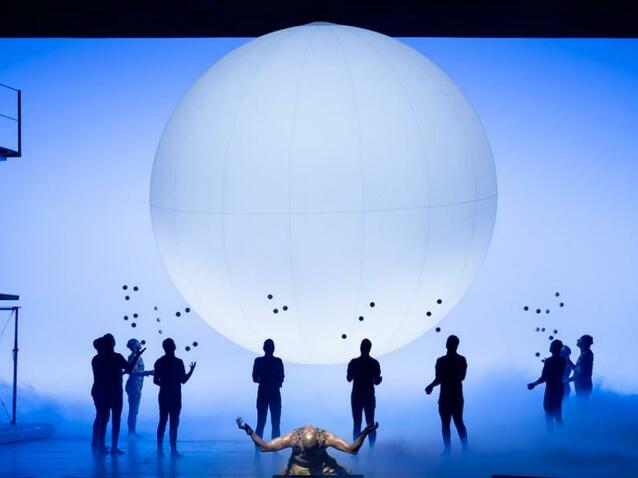 © Sergi Panizo / Gran Teatre del Liceu
© Sergi Panizo / Gran Teatre del Liceu
Philip Glass’s Akhnaten has at last reached the Gran Teatre del Liceu, in what was also its Spanish premiere. Composed in 1983 by the Baltimore-born composer, the opera centres on the figure of the pharaoh - husband of the celebrated and photogenic Nefertiti - who sought to establish monotheism in fourteenth-century BCE Egypt, only to fail in the face of fierce opposition from the priestly caste whose privileges his reforms threatened.
Structured in three acts charting the pharaoh’s rise to power, his reign, and ultimately his downfall and assassination, Akhnaten unfolds through a sequence of static tableaux, some of which - particularly in the opening act - recall the funerary ceremonies described in the Book of the Dead. The work eschews character interaction and traditional dialogue entirely, offering instead a succession of sung and declaimed texts in Akkadian, Ancient Egyptian, and Biblical Hebrew. A spoken English narration, delivered by the superb actor Zachary James as the Scribe, guides the audience through the events and provides essential narrative clarity.
At the heart of the opera lies the pharaoh’s hymn to the sun god Aton - a profession of faith, a kind of Credo dedicated to the sun, the one and only god. Following Glass’s own instruction, the hymn is to be sung in the language of the audience; at the Liceu, it was therefore performed in Catalan.

Akhnaten (c) Sergi Panizo / Gran Teatre del Liceu (2025)
Musically, Akhnaten is one of the quintessential embodiments of the repetitive, so-called “minimalist” style that occupied a prominent place in the late twentieth-century avant-garde, particularly in the United States. Its sound world is immediately distinctive. Glass employs all the traditional orchestral sections, yet in strikingly altered form: the string section is reduced and, remarkably, entirely without violins, while the woodwind and brass are substantially expanded.
As is customary in repetitive music, both vocal and instrumental writing are built upon the obsessive reiteration of gentle, flowing rhythmic patterns. These generate melodic cells anchored around clear tonal centres, evolving through minute and subtle shifts that create superimposed layers of sound - producing a hypnotic effect upon the listener. It is music that, while seeming to remain unchanged, is in constant evolution.
One of the most frequently performed works in Glass’s vast catalogue, Akhnaten was presented at the Liceu in the luxurious production originally created in 2016 by the English National Opera and LA Opera, stage directed by Phelim McDermott.

Akhnaten (c) Sergi Panizo / Gran Teatre del Liceu (2025)
In McDermott’s conception, all movement - indeed, every gesture of every character - unfolds in slow motion.The effect is astonishing and, in addition to the emotional distancing it provokes in the spectator, the entire action takes on the character of a ritual, of a ceremony, of a dream. McDermott gives visual form to what Glass achieves musically - apparent stasis in constant transformation. His direction, executed with meticulous precision, ensures that even those who seem motionless are, in reality, moving continuously, albeit at imperceptible speed.
The ritualised pace of the action is lightened by the presence on stage of ten jugglers, the Gandini Juggling troupe. Their inclusion could be justified by the fact that ancient Egyptian wall paintings depict jugglers at ceremonial events. Nevertheless, as one audience member was heard to remark during the interval, certain scenes inevitably took on something of a Cirque du Soleil air. Without the jugglers, the production might have achieved an even greater sense of concentrated intensity.
McDermott’s imaginative staging was further enhanced by Bruno Poet’s evocative lighting and, above all, by Kevin Pollard’s sumptuous costumes, which transcend historical time. We see, for instance, Egyptian “tailcoats” and pharaoh’s mothers dressed as if from the Belle Époque. This temporal fluidity is ultimately justified when the pharaoh and his family reappear as ghosts haunting Egyptian ruins now visited by tourists. Among the many striking designs, Akhnaten’s ceremonial costume is particularly remarkable, a 25-kilogram creation inspired by late-Baroque vestments reminiscent of those adorning Catholic images of the Virgin Mary in southern Europe.

Akhnaten (c) Sergi Panizo / Gran Teatre del Liceu (2025)
The resounding success of Akhnaten’s Liceu premiere was due above all to the exceptional calibre of the performances. Foremost among them was the extraordinary Anthony Roth Costanzo in the title role. The American countertenor - who, since last year, has also served as Artistic Director of Opera Philadelphia - is not only a specialist in the role but in this very production, which he has performed in several theatres. His assurance, profound understanding of the character, ritual concentration, and technical mastery of Glass’s demanding, repetitive vocal writing combined to yield a performance of genuine transcendence.
Equally compelling, both musically and dramatically, were Rihab Chaieb as Nefertiti and Katerina Tretyakova as Queen Tye. The uniformly high level of the supporting cast and chorus confirmed that the Liceu had approached this Spanish premiere with utmost seriousness.
The musical direction was entrusted to Karen Kamensek, a conductor well versed in contemporary and minimalist repertoire, who has led this work on several occasions. She drew from both orchestra and chorus - ensembles not habitually immersed in such music - performances of striking assurance and cohesion.
Xavier Pujol
Barcelona, 19th October
Akhnaten by Philip Glass. Anthony Roth Costanzo, Rihab Chaieb, Katerina Estrada Tretyakova, Joan Martín-Royo, Toni Marsol, José Manuel Montero, Zachary James, Alba Valdivieso, Carmen Buendía, Mar Esteve, Carol García, Marina Pinchuk, Anna Tobella. Gandini Juggling. Orchestra and Choir of Gran Teatre del Liceu. Conductor, Karen Kamensek. Stage director, Phelim McDermott. Scenography, Tom Pye. Costumes, Kevin Pollard. Lighting, Bruno Poet. Choreography, Sean Gandini. Production by English National Opera and LA Opera. Gran Teatre del Liceu.
the 21 of October, 2025 | Print
Comments